Are you planning a trip to Africa or have you just got back from a safari and wish it could’ve been longer? We have compiled a great list of books involving Africa to help you get excited or keep the trip going even after you get home. From novels to biographies we’ve got something for everyone!
12 Best Books to Read on a Safari
Without wasting any more of your time, here are the 12 best books you can read pre-, inter-, and post-safari:
1. “Out of Africa” by Isak Dinesen
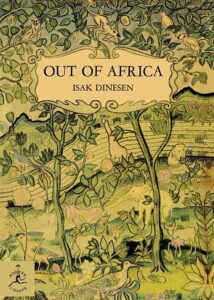 “Out of Africa” is a memoir by Danish author Karen Blixen, who wrote under the pen name Isak Dinesen. The book is a lyrical account of Blixen’s experiences living on a coffee plantation in Kenya, then known as British East Africa.
“Out of Africa” is a memoir by Danish author Karen Blixen, who wrote under the pen name Isak Dinesen. The book is a lyrical account of Blixen’s experiences living on a coffee plantation in Kenya, then known as British East Africa.
The book begins with Blixen’s arrival in Kenya, where she and her husband Baron Bror von Blixen-Finecke establish a coffee plantation on the outskirts of Nairobi. However, her marriage falls apart, and she is left to manage the plantation alone.
Blixen’s writing is full of descriptions of the African landscape, wildlife, and people, and she gives readers a sense of the beauty and danger of life in Africa. She also portrays the complex relationships between European settlers and the local people, both the Kikuyu workers on her plantation and the Masai tribes who live nearby.
Throughout the book, Blixen reflects on her own identity and her relationship to Africa, describing herself as “a European in Africa.”
2. “The No.1 Ladies’ Detective Agency” by Alexander McCall Smith
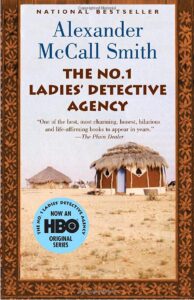 “The No.1 Ladies’ Detective Agency” is the first novel in a series of books by Scottish author Alexander McCall Smith. The book is set in Botswana and tells the story of Mma Precious Ramotswe, the first female detective in the country.
“The No.1 Ladies’ Detective Agency” is the first novel in a series of books by Scottish author Alexander McCall Smith. The book is set in Botswana and tells the story of Mma Precious Ramotswe, the first female detective in the country.
The book begins with Mma Ramotswe inheriting a small sum of money from her father, which she uses to start her own detective agency. She sets up her office in a small building in the capital city of Gaborone and begins to take on cases.
As she investigates cases such as missing husbands, cheating spouses, and stolen cars, Mma Ramotswe uses her keen intuition and knowledge of Botswana’s culture and people to solve them. She is also assisted by her assistant, Mma Makutsi, who is a recent graduate of a secretarial school and has a sharp mind.
In addition to the cases she solves, Mma Ramotswe’s personal life is also explored in the book. She has a complicated relationship with her ex-husband, who left her for another woman, and she is also courted by a local mechanic named Mr. JLB Matekoni.
3. “Things Fall Apart” by Chinua Achebe
 “Things Fall Apart” is a novel by Nigerian author Chinua Achebe, published in 1958. It tells the story of Okonkwo, a respected and successful leader in the Igbo community in Nigeria before and during the arrival of European colonizers in the late 19th century.
“Things Fall Apart” is a novel by Nigerian author Chinua Achebe, published in 1958. It tells the story of Okonkwo, a respected and successful leader in the Igbo community in Nigeria before and during the arrival of European colonizers in the late 19th century.
The book explores the clash of cultures between the Igbo people and the Europeans, and the resulting devastation that occurs. Okonkwo is fiercely proud of his cultural traditions and beliefs, but he struggles to come to terms with the changes that the Europeans bring, such as Christianity and colonial rule.
As Okonkwo tries to preserve his way of life, he faces personal struggles as well. He is haunted by the memory of his father, who was a lazy and unsuccessful man, and he is determined to not become like him.
The book is known for its vivid portrayal of Igbo culture, with rich descriptions of customs, rituals, and beliefs. It also explores themes such as identity, masculinity, and the impact of colonialism on traditional societies.
4. “The White Man’s Burden” by William Easterly
 In this book, Easterly critiques the traditional approach of aid and development, which he argues is based on a top-down, technocratic approach that focuses on providing resources and solutions from the outside without adequately engaging local people and communities. He argues that this approach has failed to achieve sustainable and meaningful change, and has often resulted in unintended consequences and negative outcomes.
In this book, Easterly critiques the traditional approach of aid and development, which he argues is based on a top-down, technocratic approach that focuses on providing resources and solutions from the outside without adequately engaging local people and communities. He argues that this approach has failed to achieve sustainable and meaningful change, and has often resulted in unintended consequences and negative outcomes.
Instead, Easterly advocates for a more decentralized and bottom-up approach to development, which emphasizes the importance of local knowledge, ownership, and accountability. He argues that this approach can empower people and communities to take charge of their own development and create solutions that are tailored to their specific needs and contexts.
Overall, “The White Man’s Burden” by William Easterly challenges traditional notions of aid and development and offers a critical perspective on the role of the West in addressing global poverty and inequality.
5. “The Last Lion: Winston Spencer Churchill” by William Manchester and Paul Reid
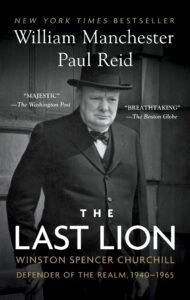
“The Last Lion” is a biographical trilogy about the life of Winston Churchill, written by American historian and biographer William Manchester and completed by journalist Paul Reid after Manchester’s death in 2004.
The final book in the trilogy, “The Last Lion: Defender of the Realm 1940-1965,” covers Churchill’s tenure as Prime Minister during World War II and his postwar career, including his efforts to rebuild Britain and his role in shaping the international order during the Cold War. The book also explores Churchill’s personal life, including his relationships with his family, his struggles with depression, and his enduring legacy as one of the greatest statesmen of the 20th century.
Overall, “The Last Lion” is a comprehensive and authoritative biography of one of the most important figures in modern history. It provides a detailed and insightful look at Churchill’s life and career, as well as the political, social, and cultural context in which he lived and worked.
6. “When a Crocodile Eats the Sun” by Peter Godwin

“When a Crocodile Eats the Sun” is a memoir by Zimbabwean writer and journalist Peter Godwin. The book tells the story of Godwin’s return to Zimbabwe, his childhood home, during the tumultuous years of political and economic upheaval that marked the end of President Robert Mugabe’s rule.
Godwin explores the history of Zimbabwe, from the early colonial period to the present day, through the lens of his personal experiences and those of his family and friends. He delves into the complex issues of race, identity, and power that have shaped Zimbabwe’s past and present, and examines the legacy of Mugabe’s regime on the country and its people.
The book also explores Godwin’s journey of reconciliation with his father, who was a white farmer in Zimbabwe during the years of land reform and political violence. Through his conversations with his father and his interactions with the people of Zimbabwe, Godwin grapples with the complexities of identity, belonging, and responsibility.
7. “The Sunbird” by Wilbur Smith
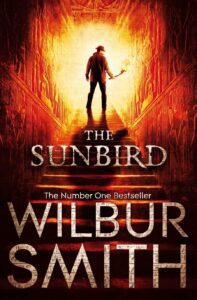
“The Sunbird” is a novel by South African author Wilbur Smith, published in 1972. The book is an adventure story set in Zimbabwe and follows the journey of an archaeologist named Dr Ben Kazin as he searches for the lost city of Opet, which is said to contain a treasure known as the “Sunbird”.
As Dr Kazin delves deeper into the mysteries of Opet, he must navigate treacherous terrain, confront dangerous wildlife, and outwit rival treasure hunters who will stop at nothing to claim the Sunbird for themselves. Along the way, he meets a cast of colorful characters, including a beautiful African princess, a British aristocrat with a dark past, and a wise old tribal chief.
Through its vivid descriptions of the African landscape and its richly drawn characters, “The Sunbird” offers a thrilling and immersive reading experience. The book also touches on themes such as colonialism, cultural identity, and the ethics of archaeological exploration, adding depth and complexity to its adventure story framework.
8. “Long Walk to Freedom” by Nelson Mandela
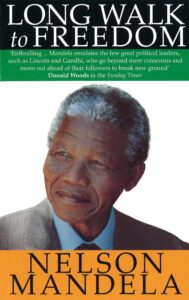 “Long Walk to Freedom” is an autobiographical book by South African anti-apartheid revolutionary and political leader Nelson Mandela. The book covers Mandela’s life from his early childhood in a rural village to his political activism, imprisonment, and eventual release and election as President of South Africa.
“Long Walk to Freedom” is an autobiographical book by South African anti-apartheid revolutionary and political leader Nelson Mandela. The book covers Mandela’s life from his early childhood in a rural village to his political activism, imprisonment, and eventual release and election as President of South Africa.
Mandela’s narrative is one of perseverance and resilience in the face of immense adversity. He describes the brutalities of apartheid and how it affected every aspect of black South African life, from education and healthcare to housing and employment. He also details his own experiences as a political prisoner, including his time on Robben Island and his eventual release after 27 years in captivity.
Throughout the book, Mandela speaks of the importance of unity, forgiveness, and reconciliation in the struggle against apartheid. He describes his relationships with other anti-apartheid leaders, including Oliver Tambo and Walter Sisulu, and his efforts to build a multi-racial movement for justice and equality in South Africa.
9. “The Power of One” by Bryce Courtenay
 “The Power of One” is a novel by Australian author Bryce Courtenay, published in 1989. The book is a coming-of-age story set in South Africa during the 1930s and 1940s and follows the journey of a young boy named Peekay as he navigates the challenges of growing up in a society riven by racial and political tensions.
“The Power of One” is a novel by Australian author Bryce Courtenay, published in 1989. The book is a coming-of-age story set in South Africa during the 1930s and 1940s and follows the journey of a young boy named Peekay as he navigates the challenges of growing up in a society riven by racial and political tensions.
As a white boy growing up in a rural area, Peekay must learn to navigate the complex social hierarchies of apartheid-era South Africa. He faces discrimination and prejudice from both black and white people but finds solace in his relationships with a range of colorful characters, including his mentor, a black boxer named Doc.
The novel is also a celebration of the transformative power of education and personal determination. Peekay is determined to overcome the limitations imposed on him by his social status and pursue his dream of becoming a boxer. Through hard work, and the guidance of his mentors, he is able to achieve his goals and ultimately become a symbol of hope for those around him.
10. “Cry, the Beloved Country” by Alan Paton
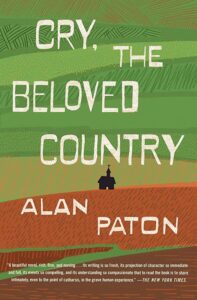 “Cry, the Beloved Country” is a novel by South African author Alan Paton, published in 1948. The book is a powerful and deeply moving story that explores the impact of apartheid on South African society.
“Cry, the Beloved Country” is a novel by South African author Alan Paton, published in 1948. The book is a powerful and deeply moving story that explores the impact of apartheid on South African society.
The novel follows the story of Reverend Stephen Kumalo, a black South African pastor who travels to Johannesburg in search of his son, Absalom. Kumalo discovers that his son has become involved in a life of crime, and has been charged with murder. As Kumalo tries to navigate the complexities of the legal system and find a way to save his son, he confronts the harsh realities of life in Johannesburg and the devastating effects of apartheid on his own family and community.
Through the character of Kumalo and his interactions with other South Africans of different races and backgrounds, Paton offers a poignant critique of the racial segregation and injustice that defined South Africa under apartheid. The book also explores themes of family, forgiveness, and the search for meaning in a world defined by inequality and suffering.
11. “The Elephant Whisperer” by Lawrence Anthony
 “The Elephant Whisperer” is a non-fiction book by South African conservationist Lawrence Anthony, published in 2009. The book tells the true story of Anthony’s efforts to save a group of traumatized elephants on his game reserve in South Africa.
“The Elephant Whisperer” is a non-fiction book by South African conservationist Lawrence Anthony, published in 2009. The book tells the true story of Anthony’s efforts to save a group of traumatized elephants on his game reserve in South Africa.
After a family of elephants is relocated to Anthony’s game reserve, they become agitated and hostile, damaging property and threatening the safety of the other animals on the reserve. Rather than resorting to traditional methods of controlling the animals, such as tranquilizing or culling them, Anthony decides to try to understand and communicate with the elephants.
Over time, Anthony develops a deep bond with the elephants, learning to read their behavior and communicate with them in ways that earn their trust and respect. As he works to integrate the elephants into the reserve and protect them from poachers and other threats, he becomes an unlikely hero of conservation and a powerful advocate for the preservation of wildlife and their habitats.
An inspiring and heartwarming read that offers a unique perspective on the bond between humans and animals in Africa.
12. “A Bend in the River” by V.S. Naipaul
 “A Bend in the River” is a novel by Trinidadian author V.S. Naipaul, published in 1979. The book tells the story of Salim, a Muslim Indian merchant who moves from the coast to a small town on the Congo River in Central Africa.
“A Bend in the River” is a novel by Trinidadian author V.S. Naipaul, published in 1979. The book tells the story of Salim, a Muslim Indian merchant who moves from the coast to a small town on the Congo River in Central Africa.
As Salim tries to establish himself in his new home, he becomes increasingly involved in the politics and social upheavals of post-colonial Africa. He witnesses the rise of a brutal dictator, and the resulting violence and corruption that tear apart the fabric of society. Through Salim’s experiences, Naipaul offers a searing critique of the legacy of colonialism in Africa, as well as the political and cultural tensions that continue to shape the continent today.
The novel also explores themes of identity and cultural dislocation, as Salim struggles to navigate the complex racial and ethnic dynamics of his new home. Through his relationships with a range of characters, including an African woman named Yvette and a Belgian expatriate named Raymond, Salim comes to question his own assumptions about race, religion, and power.

